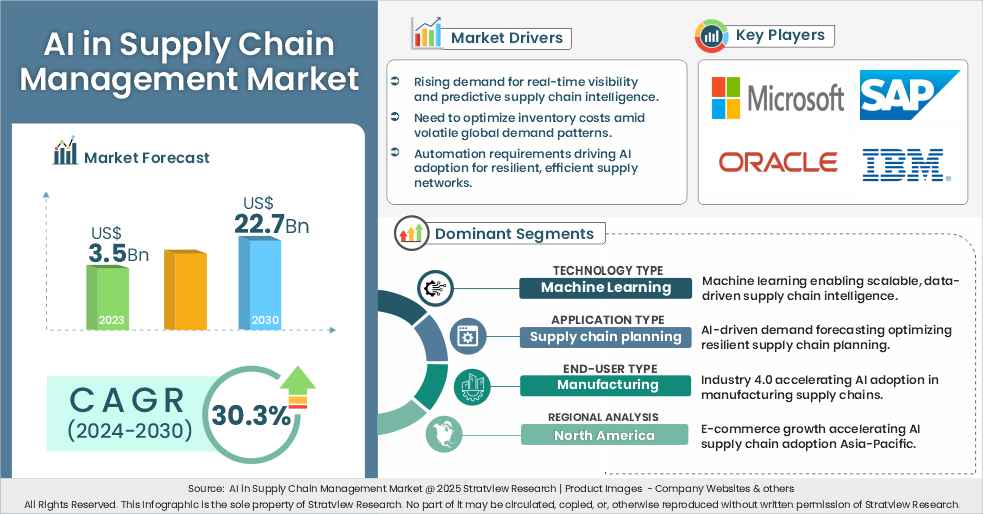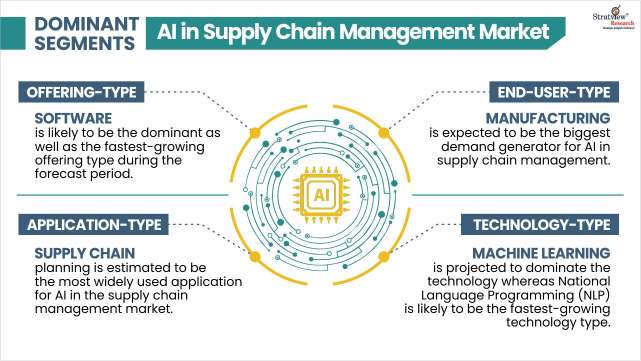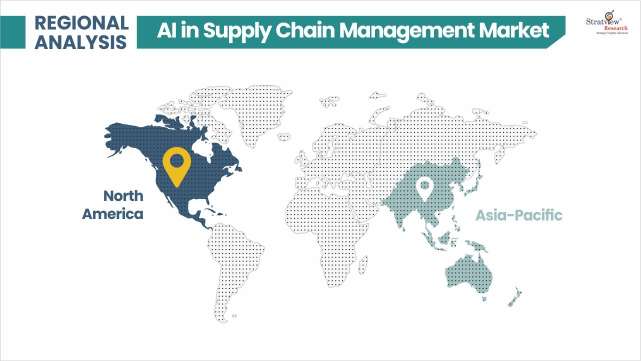Market Insights
“The global AI in supply chain management market size was valued at US$3.5 billion in 2023 and is likely to grow at a dynamic CAGR of 30.3% in the long run to reach US$22.7 billion in 2030.”
AI in supply chain management refers to the use of artificial intelligence technologies to optimize, automate, and enhance various processes involved in managing a supply chain. Supply chains encompass all the steps and activities involved in producing and delivering a product or service, from sourcing raw materials and manufacturing to logistics, warehousing, inventory management, and customer delivery.

Want to get a free sample? Register Here
Market Dynamics
AI offers several benefits in Supply Chain Management, such as improved efficiency, enhanced accuracy, cost reduction, faster response times, a better customer experience, and informed decision-making. By leveraging AI technologies, businesses can enhance various aspects of their supply chain operations, leading to more effective and responsive supply chain management.
The key components of AI in supply chain management include machine learning, natural language processing (NLP), context-aware computing, and computer vision. The AI in supply chain management is primarily used for fleet management, supply chain planning, warehouse management, virtual assistant, risk management, and freight brokerage.
Recent Market JVs and Acquisitions
A decent number of strategic alliances, including M&As, JVs, etc. have been performed over the past few years:
- In August 2024, Korber AG acquired Mercurygate International Inc. to deliver a comprehensive, innovative, and scalable supply chain execution portfolio by utilizing Mercurygate’s capabilities of transportation management systems (TMS).
- In March 2024, Blue Yonder acquired One Network Enterprises to strengthen its position as a leading provider of end-to-end supply chain solutions.
- In March 2024, ArcBest entered into a partnership with NVIDIA to improve supply chain management with new AI “omniverse” products and services.
COVID-19 Impact
The pandemic has accelerated the adoption of AI in supply chain management, enabling businesses to build more resilient supply chains through improved demand forecasting, risk management, and contingency planning.
The pandemic highlighted the need for resilient supply chains capable of adapting to disruptions. The adoption of AI in supply chain management as businesses sought to improve resilience, visibility, and efficiency in the face of disruptions.
Segments Analysis
|
Segmentations
|
List of Sub-Segments
|
Segments with High Growth Opportunity
|
|
Offering-Type Analysis
|
Hardware, Software, and Services
|
Software is likely to be the dominant as well as the fastest-growing offering type during the forecast period.
|
|
Technology-Type Analysis
|
Machine learning, Natural Language Processing (NLP), Context-Aware Computing, and Computer Vision
|
Machine Learning is projected to dominate the technology whereas Natural Language Processing (NLP) is likely to be the fastest-growing technology type.
|
|
Application-Type Analysis
|
Fleet Management, Supply Chain Planning, Warehouse Management, Virtual Assistant, Risk Management, Freight Brokerage, and Others
|
Supply chain planning is estimated to be the most widely used application for AI in the supply chain management market.
|
|
End-User-Type Analysis
|
Automotive, Aerospace, Logistics, Manufacturing, Retail, Healthcare, Consumer-Packaged Goods, Food & Beverages, and Others
|
Manufacturing is expected to be the biggest demand generator for AI in supply chain management whereas retail is likely to register the fastest growth in the market.
|
|
Regional Analysis
|
North America, Europe, Asia-Pacific, and Rest of the World
|
North America is anticipated to remain the largest market, whereas Asia-Pacific is projected to witness the highest growth during the forecast period.
|
Offering Trends
“Software is expected to maintain its indisputable lead and is likely to grow at the fastest rate for the AI in supply chain management market during the forecast period.”
- The AI in the supply chain management market is segmented into hardware, software, and services.
- Software solutions can be customized to various supply chain functions, including demand forecasting, inventory management, transportation optimization, and quality control.
- The software can easily scale up or down to meet changing business needs, making it a flexible and cost-effective solution.
- AI software offers powerful analytics and insights critical for optimizing supply chain operations. Predictive analytics, real-time monitoring, and machine learning algorithms aid organizations in making data-driven decisions, improving forecasting, and enhancing operational efficiency.

Want to get a free sample? Register Here
Technology Trends
“Machine learning's adaptability, maturity, and data-driven approach establish it as the leading technology of the market.”
- The market is segmented into machine learning (ML), natural language processing (NLP), context-aware computing, and computer vision.
- ML is inherently data-driven, making it well-suited for supply chain applications, which depend on large amounts of data to make informed decisions.
- ML can be scaled to handle large datasets and complex models, ensuring that it can meet the needs of even the largest businesses.
- NLP's ability to automate, analyze, and enhance textual data processing is driving its rapid growth in the AI supply chain management market. NLP-powered chatbots provide automated customer support by answering questions and resolving issues.
Application Trends
“Supply chain planning is expected to remain the forerunner of the market throughout the forecast period.”
- The market is segmented into fleet management, supply chain planning, warehouse management, virtual assistant, risk management, freight brokerage, and others.
- Supply chain planning deals with the major challenges of supply chain management, including demand variability, complexity, cost efficiency, risk management, and customer expectations.
- AI algorithms can analyze data to predict future demand, helping businesses optimize inventory and production planning.
- Supply chain planning is projected to experience rapid growth due to increasing complexity in global trade and the necessity for efficient, resilient supply chains to fulfill evolving customer demands and mitigate risks.
End-User Trends
“Manufacturing is projected to remain the dominant, whereas retail is expected to be the fastest-growing end-user of the market during the forecast period.”
- The market is segmented into automotive, aerospace, logistics, manufacturing, retail, healthcare, consumer-packaged goods, food & beverages, and others.
- The manufacturing industry is at the forefront of accepting Industry 4.0 initiatives, which highlight the use of AI, IoT, and automation to develop smart factories. These technologies improve productivity, flexibility, and efficiency, leading to increased AI adoption in supply chain management.
- Manufacturing creates large amounts of data, which AI can use to spot trends, optimize processes, and improve decision-making.
- The retail industry is expected to register the fastest growth in the upcoming years due to factors such as the rapid expansion of e-commerce, evolving consumer preferences, the necessity for real-time inventory management, and the digital transformation of the retail industry.
Regional Insights
“North America is expected to remain the largest market for AI in supply chain management whereas Asia-Pacific is projected to witness the fastest growth during the forecast period.”
- The region's significant share can be attributed to the presence of developed economies that prioritize enhancing existing supply chain solutions.
- Additionally, key players in the industry, such as Microsoft Corporation, Inc., Oracle Corporation, Amazon.com Inc., and IBM Corporation, contributed to this share.
- Asia-Pacific’s rapid economic growth, e-commerce expansion, large consumer market, increased adoption of advanced technologies, complex supply chains, and the need for cost optimization, resilience, and sustainability are the key reasons behind the region’s fastest growth.
- Increasing adoption of deep learning and Natural Language Processing (NLP) technologies for applications in automotive, retail, and manufacturing industries in the Asia-Pacific region.

Want to get a free sample? Register Here
Key Players
The market is consolidated with the presence of a few players. Most of the major players compete in some of the governing factors, including price, product & service offerings, regional presence, etc. The following are the key players in the AI in Supply Chain Management Market.
Here is the list of the Top Players (Based on Dominance)
- Microsoft Corporation, Inc.
- Oracle Corporation
- SAP SE
- IBM Corporation
- Amazon.com Inc.
- Google LLC
Note: The above list does not necessarily include all the top players in the market.
Are you the leading player in this market? We would love to include your name. Write to us at sales@stratviewresearch.com
Report Features
This report provides market intelligence in the most comprehensive way. The report structure has been kept such that it offers maximum business value. It provides critical insights into the market dynamics and will enable strategic decision-making for the existing market players as well as those willing to enter the market.
What Deliverables Will You Get in this Report?
|
Key questions this report answers
|
Relevant contents in the report
|
|
How big is the sales opportunity?
|
In-depth Analysis of the AI in Supply Chain Management Market
|
|
How lucrative is the future?
|
The market forecast and trend data and emerging trends
|
|
Which regions offer the best sales opportunities?
|
Global, regional, and country-level historical data and forecasts
|
|
Which are the most attractive market segments?
|
Market segment analysis and Forecast
|
|
Which are the top players and their market positioning?
|
Competitive landscape analysis, Market share analysis
|
|
How complex is the business environment?
|
Porter’s five forces analysis, PEST analysis, Life cycle analysis
|
|
What are the factors affecting the market?
|
Drivers & challenges
|
|
Will I get the information on my specific requirement?
|
10% free customization
|
Research Methodology
- This strategic assessment report from Stratview Research provides a comprehensive analysis that reflects today’s AI in supply chain management market realities and future market possibilities for the forecast period.
- The report segments and analyzes the market in the most detailed manner to provide a panoramic view of the market.
- The vital data/information provided in the report can play a crucial role for market participants as well as investors in the identification of the low-hanging fruits available in the market as well as to formulate growth strategies to expedite their growth process.
- This report offers high-quality insights and is the outcome of a detailed research methodology comprising extensive secondary research, rigorous primary interviews with industry stakeholders, and validation and triangulation with Stratview Research’s internal database and statistical tools.
- More than 1,000 authenticated secondary sources, such as company annual reports, fact books, press releases, journals, investor presentations, white papers, patents, and articles, have been leveraged to gather the data.
- We conducted more than 15 detailed primary interviews with market players across the value chain in all four regions and industry experts to obtain both qualitative and quantitative insights.
Customization Options
With this detailed report, Stratview Research offers one of the following free customization options to our respectable clients:
Company Profiling
- Detailed profiling of additional market players (up to three players)
- SWOT analysis of key players (up to three players)
Competitive Benchmarking
- Benchmarking of key players on the following parameters: Product portfolio, geographical reach, regional presence, and strategic alliances
Custom Research: Stratview Research offers custom research services across sectors. In case of any custom research requirement related to market assessment, competitive benchmarking, sourcing and procurement, target screening, and others, please send your inquiry to sales@stratviewresearch.com

